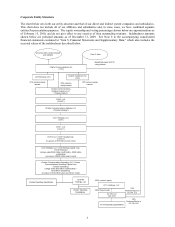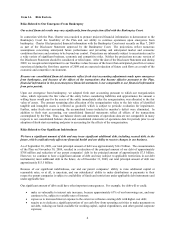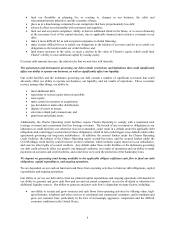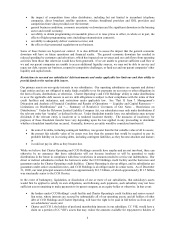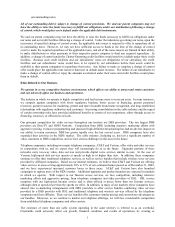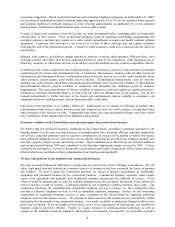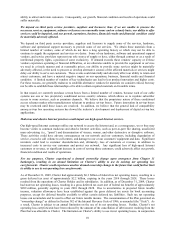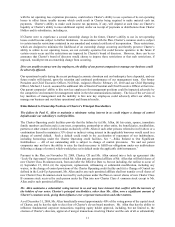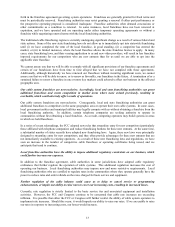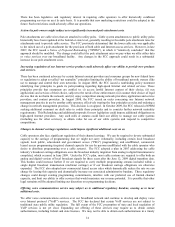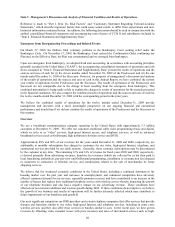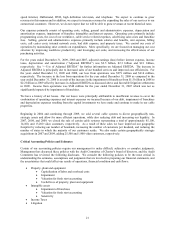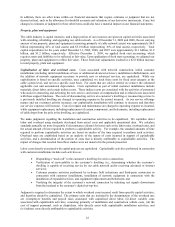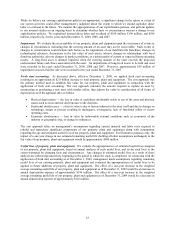Charter 2009 Annual Report Download - page 16
Download and view the complete annual report
Please find page 16 of the 2009 Charter annual report below. You can navigate through the pages in the report by either clicking on the pages listed below, or by using the keyword search tool below to find specific information within the annual report.13
forth in the franchise agreement governing system operations. Franchises are generally granted for fixed terms and
must be periodically renewed. Franchising authorities may resist granting a renewal if either past performance or
the prospective operating proposal is considered inadequate. Franchise authorities often demand concessions or
other commitments as a condition to renewal. In some instances, local franchises have not been renewed at
expiration, and we have operated and are operating under either temporary operating agreements or without a
franchise while negotiating renewal terms with the local franchising authorities.
The traditional cable franchising regime is currently undergoing significant change as a result of various federal and
state actions. Some of the new state franchising laws do not allow us to immediately opt into statewide franchising
until (i) we have completed the term of the local franchise, in good standing, (ii) a competitor has entered the
market, or (iii) in limited instances, where the local franchise allows the state franchise license to apply. In many
cases, state franchising laws, and their varying application to us and new video providers, will result in less franchise
imposed requirements for our competitors who are new entrants than for us until we are able to opt into the
applicable state franchise.
We cannot assure you that we will be able to comply with all significant provisions of our franchise agreements and
certain of our franchisors have from time to time alleged that we have not complied with these agreements.
Additionally, although historically we have renewed our franchises without incurring significant costs, we cannot
assure you that we will be able to renew, or to renew as favorably, our franchises in the future. A termination of or a
sustained failure to renew a franchise in one or more key markets could adversely affect our business in the affected
geographic area.
Our cable system franchises are non-exclusive. Accordingly, local and state franchising authorities can grant
additional franchises and create competition in market areas where none existed previously, resulting in
overbuilds, which could adversely affect results of operations.
Our cable system franchises are non-exclusive. Consequently, local and state franchising authorities can grant
additional franchises to competitors in the same geographic area or operate their own cable systems. In some cases,
local government entities and municipal utilities may legally compete with us without obtaining a franchise from the
local franchising authority. In addition, certain telephone companies are seeking authority to operate in
communities without first obtaining a local franchise. As a result, competing operators may build systems in areas
in which we hold franchises.
In a series of recent rulemakings, the FCC adopted new rules that streamline entry for new competitors (particularly
those affiliated with telephone companies) and reduce franchising burdens for these new entrants. At the same time,
a substantial number of states recently have adopted new franchising laws. Again, these new laws were principally
designed to streamline entry for new competitors, and they often provide advantages for these new entrants that are
not immediately available to existing operators. As a result of these new franchising laws and regulations, we have
seen an increase in the number of competitive cable franchises or operating certificates being issued, and we
anticipate that trend to continue.
Local franchise authorities have the ability to impose additional regulatory constraints on our business, which
could further increase our expenses.
In addition to the franchise agreement, cable authorities in some jurisdictions have adopted cable regulatory
ordinances that further regulate the operation of cable systems. This additional regulation increases the cost of
operating our business. Local franchising authorities may impose new and more restrictive requirements. Local
franchising authorities who are certified to regulate rates in the communities where they operate generally have the
power to reduce rates and order refunds on the rates charged for basic service and equipment.
Further regulation of the cable industry could cause us to delay or cancel service or programming
enhancements, or impair our ability to raise rates to cover our increasing costs, resulting in increased losses.
Currently, rate regulation is strictly limited to the basic service tier and associated equipment and installation
activities. However, the FCC and Congress continue to be concerned that cable rate increases are exceeding
inflation. It is possible that either the FCC or Congress will further restrict the ability of cable system operators to
implement rate increases. Should this occur, it would impede our ability to raise our rates. If we are unable to raise
our rates in response to increasing costs, our losses would increase.


